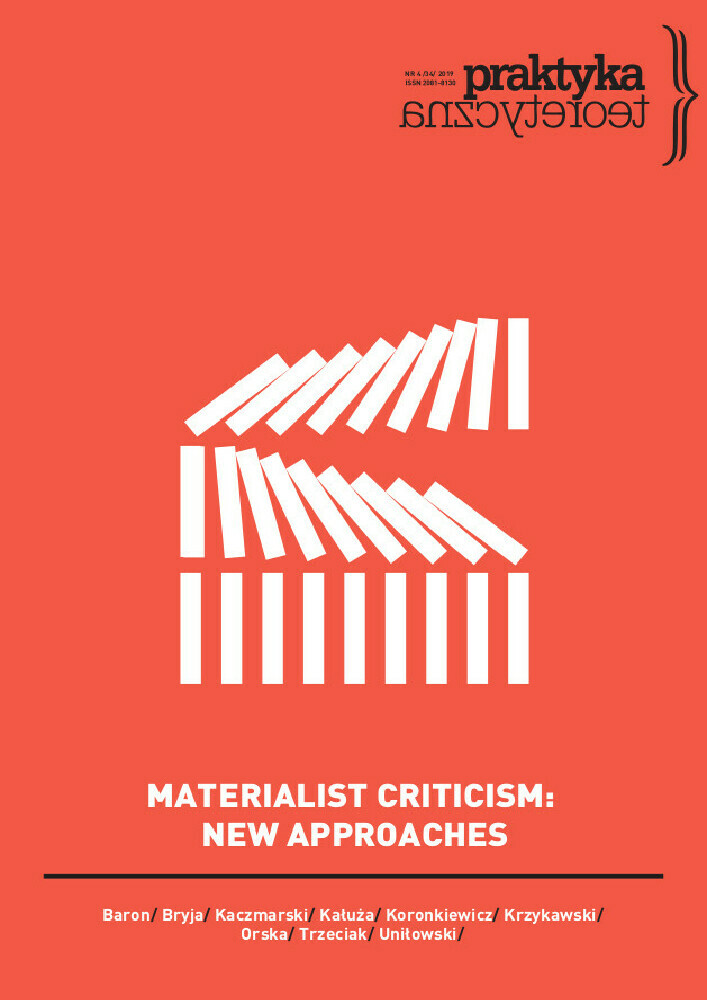Abstract
This article attempts to explain the reason behind a secondary division within the Spinozian immanence principle - a principle that occurs, or is construed, within what could be seen (after Deleuze) as the level of practice, and that remains crucial to the so-called posthumanist turn. Posthumanism seems to ascribe an important role to claims and theses that are oriented towards the abolishment of all dichotomies that rupture the existing substance (dichotomies such as form-matter, but also internal-external, subject-object, soul-body, reflection-truth/experience). Interestingly, embracing such a performative perspective - one in which philosophy or theory is something that is „performed” - is only possible when the division between the „immanence of practice” and the „poststructuralist” ideas of literariness or textuality is maintained and emphasised. The reason for this is that the latter has been strongly associated with the centrality of the human being, their language and their intellectual creations (see e.g. Braidotti, Barad). But, as I would like to point out, referring to Deleuze and Guattari themselves, this allegedly poststructuralist framework has been successfully transcended by poststructuralists themselves. Nonetheless, this did not lead them to exclude the art of language - including literature which, seen here as a type of social practice, was among the chief interests of these French philosophers.
References
Barad, Karen. 2007. “Meeting the Universe Halfway: Quantum Physics and the Entaglement of Matter and Meaning”. Durham-London: Duke University Press.
Barad, Karen. 2003. “Posthumanist performativity: Toward an Understanding of How Matter Comes to Matter”. “Signs. Journal of Women in Culture and Society” 28 (3).
Barthes Roland. 1998. „Od dzieła do tekstu”. Trans. Michał Paweł Markowski. „Teksty Drugie” 6.
Bednarek Joanna. 2012. „Polityka poza formą. Ontologiczne uwarunkowania filozofii polityki”. Poznań: Wydawnictwo Poznańskie.
Braidotti, Rosi. 2006. “The Ethics of Becoming-Inperceptible”. In: “Deleuze in Philosophy”. Constantine V. Boundas (ed.) Edinbourgh: Edinbourgh University Press.
Braidotti, Rosi. 2013. „Posthuman”. Cambridge: Polity Press.
Burzyńska, Anna. 2013. „Dekonstrukcja, polityka, performatyka”. Kraków: Universitas.
Czapliński, Przemysław. 2017. „Sploty”. In: „Nowa humanistyka. Zajmowanie pozycji, negocjowanie autonomii”. Przemysław Czapliński, Ryszard Nycz (ed.). Warszawa: Wydawnictwo IBL PAN.
Dauksza, Agnieszka. 2017. „Afektywny modernizm. Nowoczesna literatura polska w interpretacji relacyjnej”. Warszawa: Wydawnictwo IBL PAN.
Deleuze, Gilles. 2000. „Proust and Signs”. Trans. Richard Howard. Minneapolis: University of Minnesota Press.
Deleuze, Gilles. 1988. “Spinoza. Practical Philosophy”. Transl. Robert Hurley. San Francisco: City Light Books.
Deleuze Gilles, Guattari Félix. 1994. “What is Philosophy?”. Trans. Hugh Tomilson. New York: Graham Burchell. Columbia Univeristy Press.
Deleuze Gilles, Guattari Félix. 1987. “Thousand Plateaus”. Transl. Brian Massumi. Minneapolis: University of Minnesota Press.
Deleuze Gilles, Guattari Félix. 1983. “Anti-Oedipus”. Transl. Robert Hurley, Marc Seem, Helen R. Lane. Minneapolis: University of Minnesota Press.
Derrida, Jacques. 1981. “Postions”. Trans. Alan Bass. Chicago: University of Chicago Press.
Domańska Ewa, Loba Mirosław. 2010. „Wstęp”. In: “French theory w Polsce”. Ewa Domańska, Mirosław Loba (ed.). Poznań: Wydawnictwo Poznańskie.
Glosowitz, Monika. 2019. „Maszynerie afektywne. Literackie strategie emancypacji w najnowszej polskiej poezji kobiet”. Warszawa: Wydawnictwo IBL PAN.
Haraway, Donna. 2006. „The Companion Species Manifesto. Dogs, People and Significant Otherness”. Chicago: Pricly Paradigm Press.
Herer, Michał. 2006. „Gilles Deleuze. Struktury, maszyny, kreacje”. Universitas: Kraków.
Janik, Mateusz. 2018. „Benedykt Spinoza. Ciało filozofii i polityka przekształcenia”. In: „Feministyczne nowe materializmy. Usytuowane kartografie”. Olga Ciemielęcka, Monika Rogowska-Stangret (ed.). Lublin: Wydawnictwo e-naukowiec.eu.
Markiewicz, Miłosz. 2017. „Pomiędzy dziedzictwem Spinozy i wyzwaniami nowego materializmu”. „Praktyka Teoretyczna”. http://www.praktykateoretyczna.pl/milosz-markiewicz-pomiedzy-dziedzictwemspinozy-awyzwaniami-nowego-materializmu-tropy/ (data dostępu:2018.12.04).
Markowski, Michał Paweł. 1997. „Efekt inskrypcji. Jacques Derrida i literatura”. Bydgoszcz: Wydawnictwo Homini.
Mroczkowski, Bartosz. 2017. „Schizofreniczna materia. O produkcji ciał, pojęć i podmiotowości”. „Praktyka Teoretyczna” 3.
Nycz, Ryszard. 2012. „Poetyka doświadczenia. Teoria – nowoczesność – literatura”. Warszawa: Wydawnictwo IBL PAN.
Nycz, Ryszard. 2017. „Kultura jako czasownik. Sondowanie nowej humanistyki”. Warszawa: Wydawnictwo Naukowe IBL PAN.
Orska, Joanna. 2018. „Retro-rewolucja. Polska kontrkultura literacka”. „Czas Kultury” 2 (197).
Rachwał Tadeusz, Sławek Tadeusz. 1992. „Maszyna do pisania. O dekonstruktywistycznej teorii Jacquesa Derridy”. Warszawa: Wydawnictwo „Rój”.
Szopa, Katarzyna. 2017. „»Nieziszczone narodziny«. Cixous i Irigaray, czyli kobiety z czarnego kontynentu”. „Postscriptum polonistyczne” 2.
Zaleski, Marek. 2015. „Wstęp”. In: „Ciała zdruzgotane – ciała oporne. Afektywne lektury XX wieku”. Adam Lipszyc, Marek Zaleski (ed.). Warszawa: Wydawnictwo IBL PAN.
Zaleski Marek. 2015. „Historyczna teraźniejszość czyli przestrzeń afektu”. In: „Ciała zdruzgotane –ciała oporne. Afektywne lektury XX wieku”. Adam Lipszyc, Marek Zaleski (ed.). Warszawa: Wydawnictwo IBL PAN.
License
“Theoretical Practice” seeks to put into practice the idea of open access to knowledge and broadening the domain of the commons. It serves the development of science, thinking and critical reflection. The journal is published in open-access mode under the CC-BY-NC-SA 4.0 license (detail available here: http://creativecommons.org/licenses/by-nc-sa/4.0/). Articles published in the journal may be freely distributed, stored, printed and utilized for academic and teaching purposes without restrictions.
They should not be, however, used for any commercial purposes or be reconstructed into derivative creations. Access to the journal may not be limited or offered for a fee by any third party.
Prospective authors are obliged to fill in, sign and send back the publishing contract compliant with the CC licencing. [PL.pdf, PL.doc, EN.pdf,EN.doc].
According to this contract, authors grant the journal a non-exclusive right to publish their work under the creative commons license (CC-BY-NC-SA 4.0) without any financial obligation on both sides of the contract.
Before submission authors should make sure that derivative materials they use are not protected by copyright preventing their non-commercial publication. Authors are responsible for any respective copyright violations.
